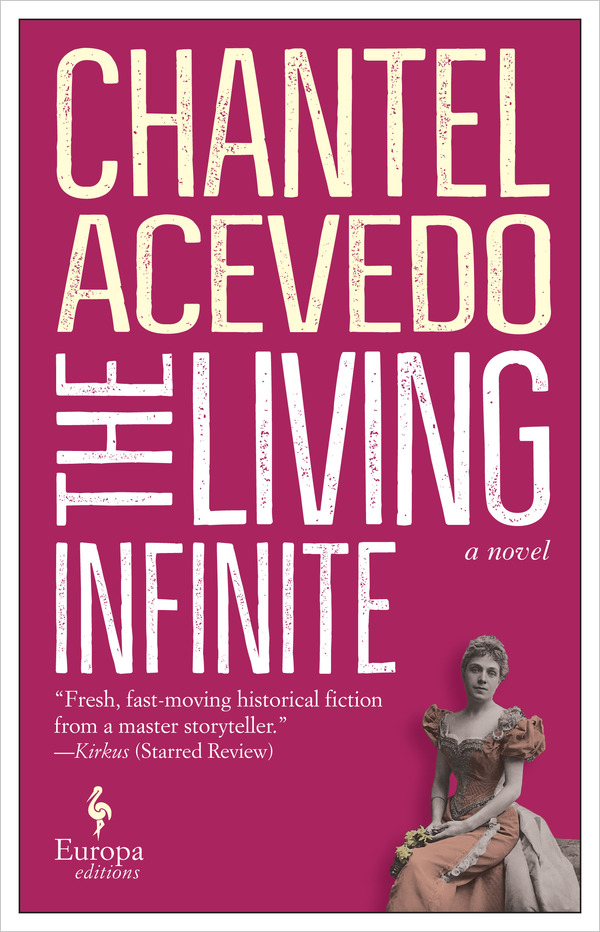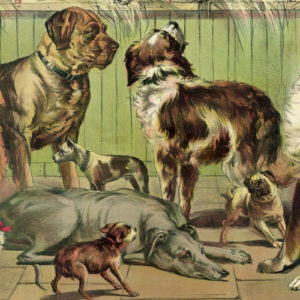
At my baptism, they would give me ninety-three names.
I could only ever manage to remember five of them—María Eulalia Francisca de Asís y Margarita de Bourbon. The world will remember just one—Eulalia. I am the first Eulalia in the Spanish royal line, a name, which means “well-spoken.” I am not certain whether, in these twenty-nine years, I have really lived up to my name.
My mother was not in attendance at my baptism. But over a hundred Spanish nobles were there to watch as I received just as many names and was washed clean of original sin. If we indeed carry the sins of Eve on our bodies at birth, then I am certain that, in the case of my own conception, I was composed of sin entirely, every thread and fiber of my being one of secrecy. Officially speaking, my father is the Prince Consort, Francisco de Asís. I have seen him often enough in my life, and have glanced at a mirror often enough, to know that he bore no part in making me, or my sisters, Paz and Pilar, for that matter. My mother’s first cousin, Francisco de Asís was not her choice for a husband. Married when they were still children, my mother was forced into her vows with a deliberate pinch on the arm from her own mother, my grandmother, in plain view of the priest and everyone in attendance. They both weptopenly during the ceremony. Did Asís father my older sister, María Isabel, and my brother, King Alfonso, may he rest in peace? Nobody thinks so.
As for my real father, I am of a mind to believe it was my mother’s secretary, Miguel Tenorio, who had the privilege. He kept his affections hidden from me, and for that I might hate him all my life, except that my older sister, Paz, has welcomed him into her life, and so, I cannot fault either his taste or his heart, for she is an excellent woman. I saw Tenorio rarely, though he once sent me a fat envelope full of poems he had written about his dead wife, Belisa. Because I was thirteen or so, at an age when a girl swears nightly that she would sooner pitch herself off a balcony than succumb to the sentimentality on display among the adults around her, I tilted my nose at the poems. In retrospect, I believe them to be quite good, and I have a better understanding of my mother’s choice in Tenorio. A woman is better off with a delicate man who writes poems than with a virile one who tosses and turns all night thanks to bloody memories of war. A kingless queen, as my mother was, holds more power than one who has to share the throne. And Tenorio, for all his worth, was no king.
What were they thinking, my mother and Tenorio, on the morning of my baptism? Neither of them was present, though Francisco de Asís was there, to hand me off to my many godparents. Perhaps they colluded together in her bedroom, whispering about the color of my eyes, whether or not I looked like him, my sleeping habits, or the quality of the newly hired nodrizas. I like to imagine them this way, having several long, and unavoidable moments together, where they couldn’t help but be drawn into one another. Whether my mother’s many love affairs were tender in that way, I’ll never know. Passionate and gentle love of this kind is a concern for any woman brought up in a royal court, for it is forbidden to us. Neither my sisters, nor my brother, nor I have had a say in whom we have married, though I believe that my brother
Alfonso, rest his soul, married for love. We have entire castles at our command, and armies, diadems and thrones, respect, fine clothes. All of these things are like iron bars on a window to me—thick and cold and oppressive. I don’t want any of them. What do I want? I want to have read a poem and fallen in love.
*
I was eleven when my brother was proclaimed King of Spain. The revolution was over. Spain would once again belong to the House of Bourbon. My mother called my sisters and me to her room and told us, bouncing in her seat like a child. My sisters and I spoke French, and only a little Spanish at the time. My mother knew only Spanish. So, it is little wonder that we when she told us about returning to Spain, we were confused, understanding only a little why we had to depart Paris, which we loved, and where we knew some freedom. At Santander, we were pelted with flowers, and red and gold bunting hung over every doorway. We rode a carriage through the countryside, and here and there, doves tied to leashes were released over our heads, then, jolted away as soon as I reached out to touch them. My mother, who had become fearful of birds after Sor Patrocino told her that they sometimes were inhabited by demons, would scream every time a dove was sent our way. Despite that, the people cheered and wept at our return, and my mother smiled at them, and looked young again in my eyes. It was as if there had never been a coup, as if my mother had always been loved this way instead of despised.
After the carriages, we boarded a train that stopped at each station through the night. At each stop, we were roused from sleep and made to greet the crowds that waited for us. By the time we reached the Escorial, the palace just outside of Madrid, we had to be carried in by the nannies, to sleep in that cold, dark castle. In the morning, we would greet our royal selves again in the Escorial’s many mirrors. Standing there, seeing myself replicated so many times, I told myself that though my body was royal, my mind would not be. I even whispered it to the many Eulalias facing me. “We belong to ourselves,” I said.
Sometimes, one thinks a particular thing, and the next moment, a thing happens to cut that thought is cut to pieces. The following morning, my brother Alfonso appeared before us. Now he was king, and we embraced him, and said, “¡Viva el Rey!” He swung me around and kissed my sisters’ cheeks.Then, a solemn look came over his slender face. “There is something I need to show you,” he said, and took me by one hand and Pilár by the other. Paz trailed after us. We went from room to room, until finally, we arrived at our empty tombs.“There you will lie, all of you,” he said, pointing to four tombs, one for each of my mother’s daughters. Alfonso, because he was king, would lie elsewhere. “And here,” he said, taking us to the Pudridero, “is where they put you to rot for a while before you go in the tomb.” His eyes glittered a little, and I thought at first that he was playing a trick on us, the way he used to prank the servants back in Madrid. Finally, he took us to another room, where the bones of centuries of infantas and infantes lay jumbled.
“I don’t want to see any of this,” Pilár whimpered. She was the delicate one, always. Paz quietly put an arm around her and shushed and shushed.
Meanwhile, I said, “I’ll make sure to die in an explosion then. Or a fire. There will be none of me to entomb.” Alfonso took a deep breath. “Your Spanish is terrible, Eulalia. Try not to speak in public,” he said. This was no prank, I realized.
“Alfonso,” I said, my voice hurt. I reached out to tickle him, to make him laugh. I wanted to recognize the brother I had once known, the sibling I had loved best of all. He did break after a moment, and smiled, and called us all beautiful in perfect French. But something of my old brother was gone forever, I knew, and I was certain that ephemeral lightness, that playful, mischievous joy, evanesced the moment he was declared king.
“I was first shown the Escorial when I was your age. I was shown these tombs. I even walked into the Pudridero and held my nose against the stench. And what I learned from it was this—that we are all destined for this place, and that we have one chance to make the right choices. Our destinies weigh far more than that of the average man or woman, sisters.” He spoke so solemnly that Pilár began to cry again. Alfonso ignored her. “We nearly lost Spain. We will not lose her again.” Oui, I thought at that moment, mon frère n’est plus la.
Our eldest sister, Maria Isabel, arrived the next morning. She looked so much like our mother that I was confused at first, and rapidly hid the novel I was reading. It was Verne’s The Mysterious Island, and I had just reached the part where an orangutan named Jupiter falls into a volcanic crevice and dies. My eyes were full of tears, and I knew that if my mother saw my distress, she would confiscate the book. When I realized it was my sister, and not my mother, I sighed with relief.
“Oh, it’s only you,” I said, which made my eldest sister wrinkle her nose at me. She was a young widow, her husband having turned a hunting rifle onto himself, but grief had not softened her. Instead, she became more of an authoritarian, more devoted to the rules of court, and nuances of protocol. It was no surprise that, after a light lunch served to us in our rooms, the first thing that Maria Isabel said to us were her rules for getting along in Spain. “You shall have no opinions and no friends,” she said to the three of us, looking long at me. “This way, we will be sure that there will be no scandals, and no trouble whatsoever made for our brother, who is doing God’s work in Spain.” I was certain then that the trip to the tombs and the Pudridero had been her idea.
We answered her with silence, our forks halfway to our mouths. No friends! No opinions? I was bubbling over with anger, and I stuttered for the first time in my life, searching for the right words to say. The words did not come at that time. Instead, they came later, in the middle of the night. What I might have said to my sister was that I deeply wished for another revolution, another exile, one without end. But, like all good responses, the idea for it came too late. Would that I had been born in ancient Sparta, where people trained in the art of the timely bon mot!
Maria Isabel countered our silence with a quiet, “Viva Rey Alfonso,” and we echoed the sentiment. In truth, we all four loved our brother very much. He was the best of us—the bravest and the kindest—and not many years later, we would pray at his bedside and wish to trade places with him, so that he would have that long life all of Spain wished him with every greeting.
__________________________________
From The Living Infinite. Used with permission of EUROPA. Copyright © 2017 by Chantel Acevedo.

